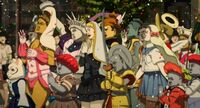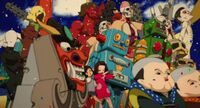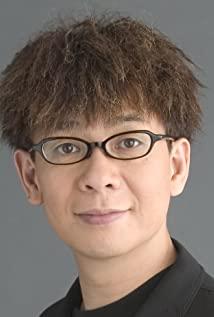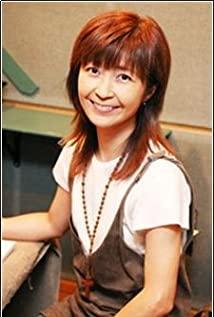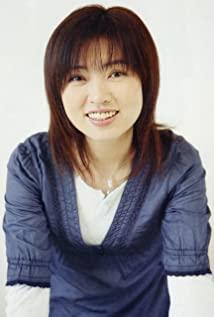Multi-line narration has always been the usual way for many brain-burning movies. For a movie narrated in this way, if you relax a little, it is likely to be thrown away by the plot. The reason is that it will confuse different narrative lines, but for this film, it is appropriate to use multi-line narrative. The director is a genius, because most of the time it talks about dreams, Fanchuan's dreams, Chiba Tsubaki's dreams; realistic dreams, dreams within dreams. They intertwine and devour each other. As I said, if there is no clear concept of multi-line narrative, it is easy to get lost in the interspersed interspersed with various dreams, and at the end ask thoughtfully, "Is it a dream or reality."
I tried to sort out the film in the simplest way to help everyone fully understand the film.
Catching the main thread is the key to understanding this film. The main line of the film is about the theft of an undeveloped DCmini that can share dreams, and the process of solving the case together with the president and Tokita of the research institute. It's just that in the process of solving the case, they need help through dreams. Fanchuan's dream, Hiroshima and Tokita's dream, and Ganqingjiro's dream are all different branch narratives when they are looking for the truth.
Below is an overview of each branch.
The first is Fanchuan's dream. In reality, Fanchuan is a policeman who is cracking a murder case, suppressing his love for movies. Fanchuan in the dream is still a policeman, but the subconscious love for movies will bypass the control and take the opportunity to break into the dream in a disguised way. Struggling to appear in a dream.
Chiba Dunzi's dream, in reality, Chiba Dunzi is calm, rigorous, and not enough to talk and laugh. It is the research institute of the research institute. The Chiba Dunzi in the dream is a red pepper, warm, sexy, and considerate. Constantly helping others in their dreams. Help Fanchuan to follow his heart in Fanchuan's dream, fight bravely in the villain's dream, and finally defeat the head of the room, Kiyujiro Kan.
The dream of Bingshi and Tokita and Xiaoshan is actually the dream of Jiro Ganqing, the big boss of this film. In reality, Hiroshima and Tokita are both genius scientists. They were bewitched by Kan Kiyojiro in their dreams and became part of the parade in their dreams. The real Oyamauchi is one of the research institutes of the institute and a colleague of Chiba Toshiko. The small mountain in the dream is the faithful servant of the head of the room, taking the head of the room to complete all kinds of dirty things.
In this way, it is easier to understand whether the movie is much easier to understand, but if I analyze it like this, it will easily destroy the original integrity and splendor of the movie. What I am talking about is less than one tenth of the wonderful movie itself.
"Red Pepper" does have the taste of Freud's psychology. It can be clearly understood from the film that a dream is the release and expression of a desire that has been suppressed into the subconscious.
From this aspect, it can be understood from a psychological point of view, seeing each of their dreams as a split personality of each person. 'Fankawa's split personality' and 'Chiba Toko's split personality Red Pepper' fought against each other with 'Oyamauchi's split personality loyal servant' and 'The head of the room's split personality Great Demon King', and finally won.
But I still tend to look at the way DCmini shared dreams that Jin Min clearly told, but in the end, the parade in the dream continued to grow, and finally broke the boundary between dream and reality. In the "Parade in a Dream" section, the picture is full of Nazi collective feeling, the music is full of rhythm and has a hint of pagan evil, full of magic, it is simply wonderful.
Many people will question whether it is a dream or a reality in the end. I don’t think it is necessary to distinguish, because this is exactly what Jin Min wants to achieve in the film, which constantly blurs the boundary between dream and reality from beginning to end. It can be completely understood that the dreams of the characters in the play are actually Jin Min's dreams.
Many people always like to see movies as real life. In fact, they don't have to. Movies, DreamWorks, are just places where dreams are made.
View more about Paprika reviews



